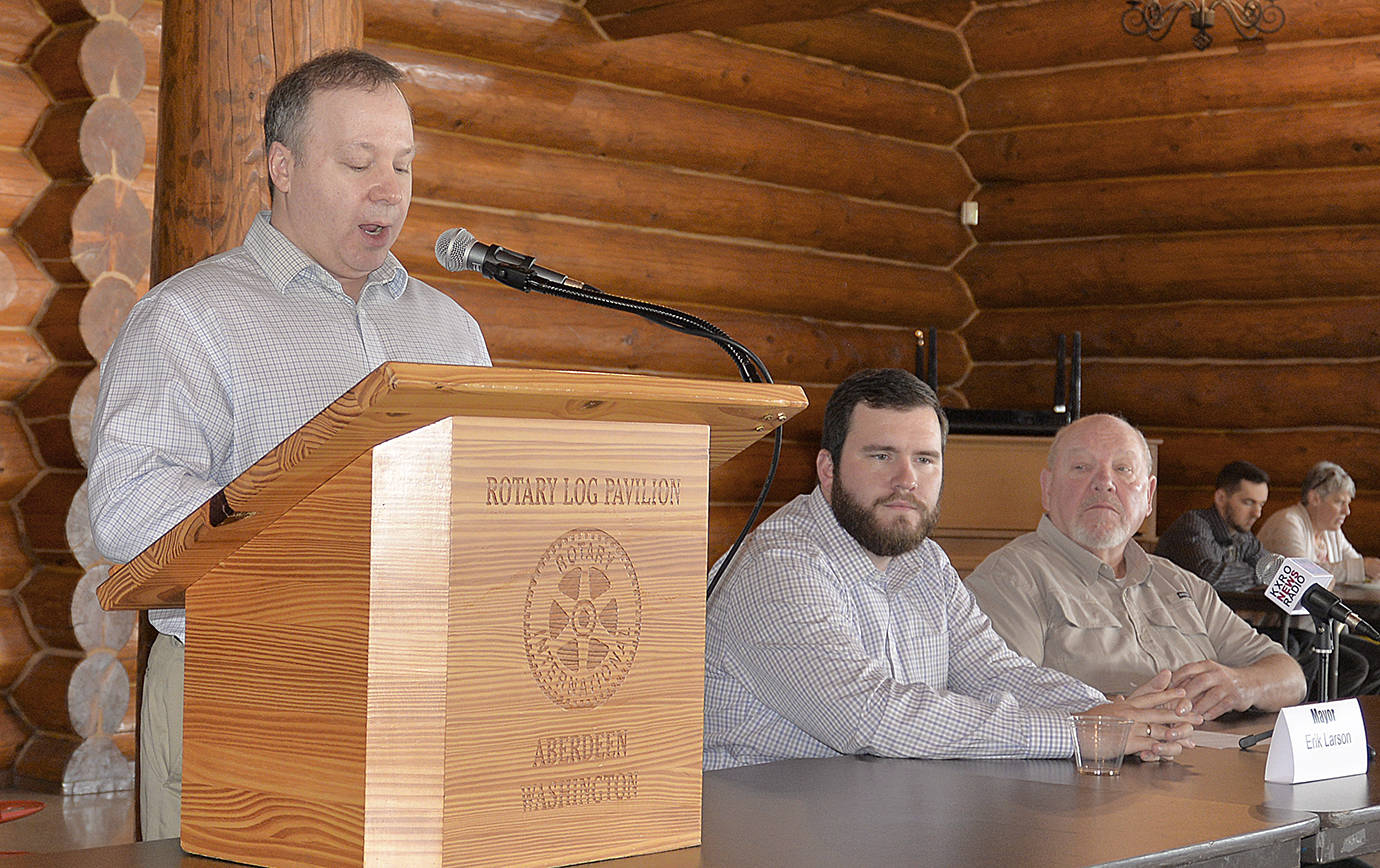Candidates for mayor of Aberdeen, Hoquiam and Ocean Shores took part in a candidates forum at the Rotary Log Pavilion in Aberdeen Tuesday.
Greater Grays Harbor Inc. and Alpha Media Grays Harbor hosted the event, part of Greater Grays Harbor’s monthly business forum lunch series.
The candidates were asked questions by members of the KXRO radio staff Kyle Pauley, Daniel Hargrove and Pat Anderson. Each was allowed two minutes to answer. Following are some highlights from the forum.
Aberdeen candidates, incumbent Mayor Erik Larson and City Councilman Pete Schave, were asked how they would mitigate the homeless issues in Aberdeen and also assist local businesses.
“The courts have ruled that the city has to, in my mind, start a new social program at the taxpayers’ expense to provide homeless services,” said Schave. He said he does not favor an “open” camp, but one in which the individuals were required to participate in “finding solutions to why they are in that predicament in the first place.”
Larson agreed recent federal court decisions have made it difficult for the city to deal with the issue.
“The city has become the target of lawsuits that I think are more politically motivated than on the issues,” he said. “They’re trying to find a community to build case law around instead of focusing on the local issue. They’re not focused on how do we fix it, but how do we create case law on the federal level.”
Larson said the city is “finishing up with the lawsuits and trying to move forward. I believe what we have provided is based on the best practices throughout the state,” and agreed that treatment or counseling needs to be provided to help individuals find solutions to the cause of their homelessness.
Incumbent Hoquiam Mayor Jasmine Dickhoff and her challenger, City Councilman Ben Winkelman, were asked how the city could help address concerns about increased rail traffic with a proposed potash facility at the Port of Grays Harbor.
Winkelman said working with area legislators would be critical. He said the proposed potash facility would include a rail loop that would hold the large unit trains within the facility, lessening impacts on crossings down the line, and that “the tracks have been there for many years and it’s something we’ll all figure out how to address” on down the line from Elma to the Port.
Dickhoff said she has been working regionally to address the issue, including talks with Larson and Elma Mayor Jim Sorensen, along with the Port of Grays Harbor, to create a “regional discussion to address freight mobility.” She said she’s “really looking to have stakeholders from every city in the region to leverage our collective authority to be competitive for transportation dollars.”
The Ocean Shores candidates, incumbent Crystal Dingler and challenger Susan Conniry, were asked how the city could assist local businesses, current and future, in the “shoulder” and off-season months when tourism numbers are low.
Conniry pointed out the city recently lost its Chamber of Commerce and she has been in discussions with local businesses about starting a business association, similar to Hoquiam’s, to fill the void created by the loss of the Chamber. She said the city can continue its work to improve its infrastructure “and make everything look nicer and brighter,” and take advantage of the city’s location in a federal Opportunity Zone to put together an investment portfolio to bring new businesses in.
Dingler said the city has grown by about 1,000 in the last nine years. “We’re a city in transition,” she said. “We have more people living here full time, which will help during the shoulder seasons, because we all need a place to shop in Ocean Shores.”
The city has also started marketing again for the first time since the recession. Dingler said the effort is small compared to pre-recession efforts, but the city is making an effort to attract businesses to Ocean Shores, and is also working with an economist to study the business climate in the city and what could be done to actively help local businesses organize and bring in additional business.
An ideological question was put to all six candidates: Should decisions be made on personal opinion, or on general consensus of the residents?
“If I’m out communicating with my constituents I don’t think that question is much of an issue,” said Schave. He said he’s providing information based on the city’s requirements, legal considerations and others, “and they’re giving me information based on feelings and opinions. If I’m communicating with them, that back and forth, we can come up with the best solution to what the issue is.”
“I think it’s something where the true litmus test of whether you are doing what the citizens think you should be doing is the election,” said Larson. He said the best thing to do is to get as much information as he can, present it to his constituents, gather input, then make the best decision for the city. “The reality is, do they respect that you took the information and made an informed smart decision for the area, and made the best decision for everyone even if it’s not what everybody wanted? If you’re worried about making sure everybody agrees with you, you won’t make many decisions at all, and that’s the worst thing you can do in a leadership position.”


